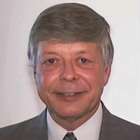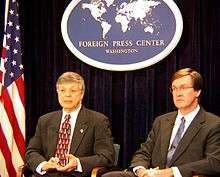Harlan Watson
| Harlan L. Watson | |
|---|---|
 2008 portrait | |
| Nationality | American |
| Occupation | civil servant |
| Known for | UNFCCC negotiator |
Harlan L. Watson is an American congressional staffer on the House Science, Space and Technology Committee.[1][2]
He holds "a B.A. in Physics from Western Illinois University, a Ph.D. in Physics from Iowa State University, and an M.A. in Economics from Georgetown University."[3]
Posts he has held include:
- chairman of the Policy and Implementation Committee of the Asia-Pacific Partnership on Clean Development and Climate
- Senior Climate Negotiator and Special Representative in the State Department
- staff member of the House of Representatives' Committee on Science
- Science Advisor to the Secretary of the Interior
- Deputy Assistant and Principal Deputy Secretary of Interior for Water and Science
- staff member of the United States Senate Subcommittee on Energy, Nuclear Proliferation, and Federal Services[3]
On February 6, 2001, a fax was sent from Exxon Mobil to the Council on Environmental Quality, a White House office. The fax asked that Watson be made "'available to work with the team' of Americans attending international climate change meetings." Later in 2001,[4] he was appointed by the George W. Bush administration as Special Envoy to the United Nations Framework Convention on Climate Change, for which he held the rank of ambassador.[3] As the chief negotiator representing the United States at the December 2005 conference in Montréal, Watson walked out of a meeting, reportedly over a disagreement about the title of a document.[5]

References
- ↑ "Harlan L. Watson - Congressional Staffer Salary Data". Legistorm.com. Retrieved 2013-11-01.
- ↑ "House Staff Directory". Sunlight Foundation. Archived from the original on 2013-11-01. Retrieved 2013-11-01.
- 1 2 3 "Watson, Harlan L". 2001-2009.state.gov. Retrieved 2013-11-01.
- ↑ Eilperin, Juliet (2005-12-05). "Climate Official's Work Is Questioned". Washington Post. Archived from the original on 2013-11-01. Retrieved 2013-11-01.
- ↑ Revkin, Andrew C. (2005-12-10). "U.S., Under Fire, Eases Its Stance in Climate Talks". New York Times. Archived from the original on 2013-11-01.